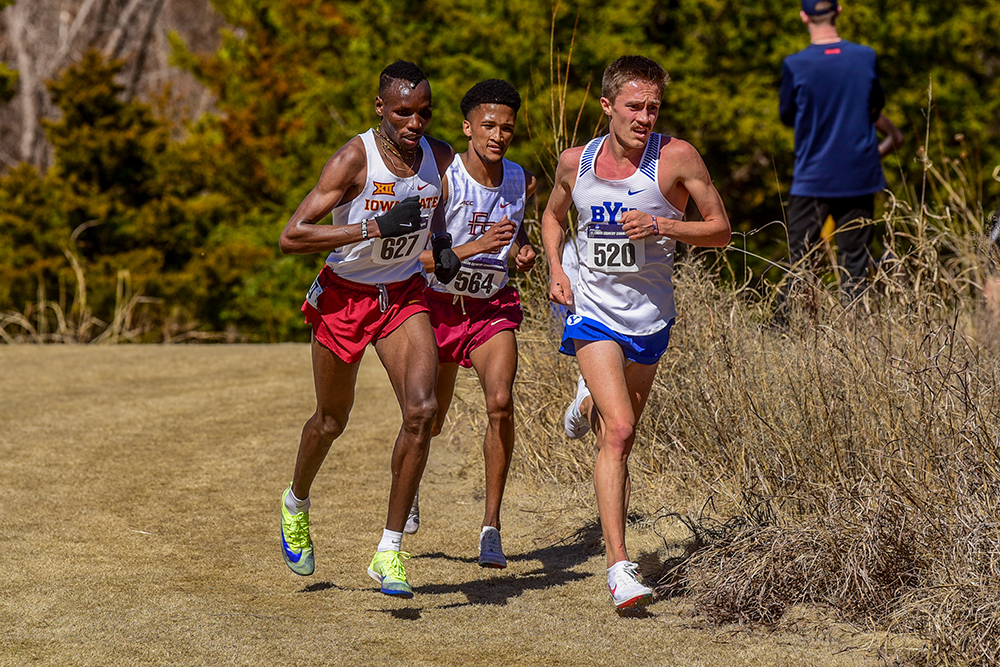
HE STILL HAS LOTS of races to run and goals to achieve but after his NCAA XC win Conner Mantz checked off one more item on his running bucket list.
The BYU junior kept to his patented get-out-quickly race plan, ran with cofavorite Wesley Kiptoo, backed off a bit as he fretted about the wind (and his team’s chances) but then rallied late and surged over the last 1.5K. His 2:57 split for his final kilo propelled him to a convincing win in 29:26.1 over what many coaches called the most difficult course in the meet’s long history.
“It was nerve-racking to go out that hard,” he recalls. “The first clock I saw on the course was at 3K and if I had seen one any earlier I would have slowed down a lot as I would have known I was going too fast.
“I usually don’t get that beat up from races. I’m very fortunate. But this one was the exception. I’ve been very sore the past couple days, especially my hamstrings, which I think came from the downhills. I ran those pretty hard. That was a very tough cross country race, absolutely the toughest course I’ve ever run.”
Mantz became BYU’s third individual champ after his coach Ed Eyestone and Josh Rohatinsky. He is the first U.S.-born champ since Galen Rupp in ’08.
“I’ve been thinking for so long about just winning it once,” he says. In this strange year of what is scheduled to feature two NCAA Champs, Mantz can make another elite list in November at Florida State. Only 7 men have finished in the top 10 four times and just 3 of them — Steve Prefontaine & Edward Cheserek with 3 each and Bob Kennedy with 2 — have more than a single title, so history beckons Mantz there as well.
More important goals loom for him on the track this spring, with yet another year of eligibility in 2021–22 remaining at BYU before a potential pro career. First, there’s the switch in mindset from harrier workouts to training for the upcoming outdoor track season, where the 5-foot-8, 130-pounder (1.73/60) has his sights firmly set on winning an NCAA track title at either 5K or 10K… or both.
His PRs are good but Mantz, 24, acknowledges a lot of improvement will be vital if he’s to have a shot at the Olympic team this summer. His 13:28.00 just came indoors while his best 10 is 28:18.18.
“I want to make the team. It’s going to be hard to do it,” he says. “There are a lot of really good U.S. distance runners so I’m going to try to run like 27:20 in the 10K and like 13:10, 13-0’s in the 5K if possible. I don’t try to put limits on myself. I think both those goals are reasonable and possible but difficult to hit.
“It’s like in 2019 cross I wanted to be in the top 3 — I really wanted to win — but sometimes you can be in great shape and not win. But that goal [he indeed placed 3rd] kept me going and let me push through the pain.”
Mantz tried the outdoor track double in ’19, with decent results but not what he expected: a 7th in the 5 and a 4th in the 10. He had been 22nd in the 10K as a frosh in ’18.
Following a storied Utah high school career, he took two years off running to complete his LDS mission in Ghana before entering BYU. “I think a lot of people would argue about the age [advantage] but the mental and emotional growth that comes on the mission from the self-discipline made a big difference,” Mantz says.
He is hardly an advocate of sit-and-kick tactics. “I want to see people hurt. I want to see people put themselves on the line,” He says in explaining that even in high school he was known for taking the lead from the start. “Most races I would go out and lead. I like running at the front. I’d always go out super-hard and sometimes paid the price.”
Coach Eyestone marvels at what his star can put up with. “He takes them into the ‘Mantz Zone.’ Or the ‘Mantz Pain Chamber,’” Eyestone has said in describing his star’s race tactics. “He can handle running a race up front at a high intensity. He has a high tolerance for pain. Either that or he’s too dumb to recognize that’s what’s coming.”
Clearly, Mantz has been smart enough to run and lead at his distinctive pace as he begins to carve his own niche in U.S. distance running.
